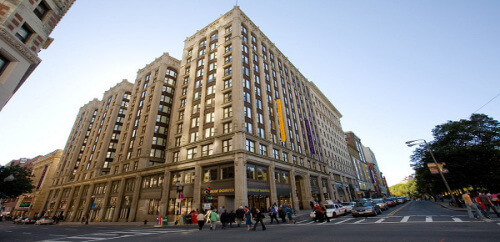A Lecture by Tom Cooper
@
Emerson College, Boston

This October, I attended my first lecture on Ethics. It was Haleema's
Family Weekend (Parents Day) and there were mock lectures for parents to attend. I
wanted to attend lectures in her course but she encouraged me to attend
those I find interesting. This was an interesting topic so I decided to
attend.
Here in the West, the study of ethics and the development of ethics in the human history is an integral part of learning.
He takes the ship on a rough and dangerous course. This is in search of prize. In this risky adventure, some of the sailors have to be on the rudder and try to steer it in a certain direction in a turbulent and stormy sea. As a result of the rough sea, one of the sailors, who is quite liked by everyone, falls off with a large piece of rudder along with him. The rope attached to the ship is now pulling the whole ship in one direction. There is a real danger that the whole ship may sink if that continues to happen. As all the hopes of rescuing the man are lost, the captain makes a decision to have the rope cut off, thus drowning the sailor in the turbulent sea. The ship is saved and all the worried crew and the slaves on the ship are happy and relieved.
Was it an ethical decision? Saving one man vs the possibility of drowning the whole ship.
What if the life at risk was not one vs 100 but 10 vs 100 or 50 /50?
Where would one draw the line?
Was the Captain right in the first place to take the whole ship in risky waters? etc
How you know whether your decision will be an ethical one?
The history of Ethics development is long. Earliest sources would include Aristotle, who favored a medium path; something between deficiency vs excess.
Immanuel Kant, simply put, would look at it with a question."What if every one do that, would it be good?" He emphasized to treat everyone as an end and not as a means.
John Stewart can be included in this list. Greater good; utilitarian approach is the way to reach an ethical conclusion in every case.
And then we have our religious sources, Biblical Golden Rule, Buddhist, Tao etc
So, in his own words, how you decided if one is making an ethical decision or not.
When you are about to make a decision, what impact it would have in the following areas. Some are overlapping, but still separate ends.
- Peacefulness. Will the outcome bring peace vs otherwise
- Equality: Will the outcome promote equality
- Justice: Will justice be served by the decision
- Compassion: Is the decision compassionate to people affected by it
- Forgiveness: Does it promote forgiveness
- Unconditional Love: self explanatory
- Non Discrimination:
- Unity: Will the outcome bring people together in a quest of unification
- Fairness: Is the decision fair to parties involved
- Inclusiveness
- Survival for All: Does the decision assure survival of all including non humans
- Humanitarianism
Gandhi:
- Perfect Outcome: The Brits were leaving and although Partition was not what he wished, he had to agree to something which has the least risk of worst outcome
- Equality
- Justice
- Non Discrimination: was the top most priority for him
- Unity: of the country was the second most
- Fairness: would come next
Mother Teresa:
- Compassion: consistent with the religious tradition
- Forgiveness
- Unconditional Love
- Inclusiveness: environment issues
- Survival of all: including non humans, and the future generations
- Humanitarianism
At the end of the lecture I walked to him and had a little chat. I asked who is an example of ethical standard in today's time one should look up to.
He responded: Malala




